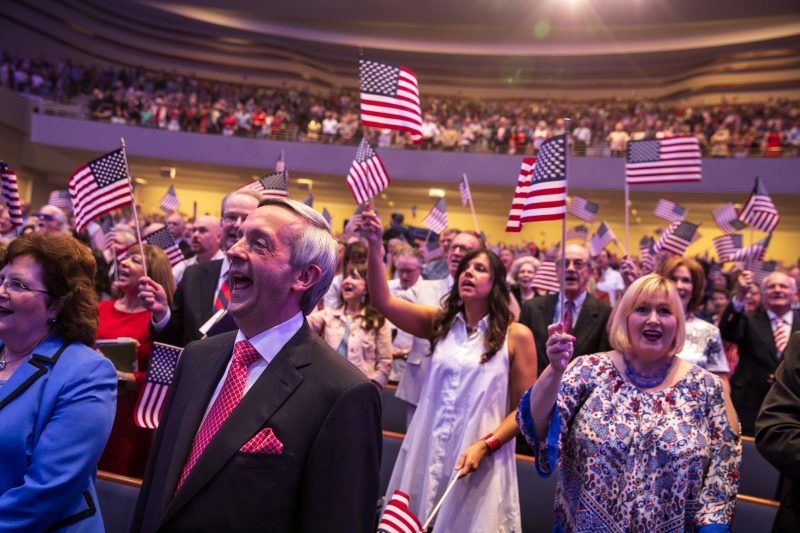What Donald Trump wanted to have happen when he announced his presidential candidacy in November was for the galaxy of Republican and conservative voices that had allied with him in his reelection effort to do the exact same thing. He wanted to plant a flag so big and so beautiful that no other Republican would dare to challenge him seriously. His desired outcome wasn’t a 2016 scrap in which he emerged victorious but a 2020 glide path in which there was no fight to win.
That is not what happened. First, the 2022 midterms went unexpectedly poorly for the GOP, with Trump taking a lot of the blame. Second, there are other candidates — particularly Florida Gov. Ron DeSantis (R) — who have demonstrated appeal. And, third, some of those whom Trump had tried to cultivate as allies with his blatantly transactional approach to politics didn’t rush to re-up their subscriptions.
Like some leaders in the evangelical community.
“Some of these prominent evangelical leaders who backed you last time, they’re not yet willing to commit,” David Brody of the Christian Broadcasting Network told Trump in an interview for Real America’s Voice on Monday. “It seems like many of them are waiting to see how the field takes shape before backing anyone. What is your message to them?”
“Well, I don’t really care,” Trump replied — then quickly undercut that insouciance. “That’s a sign of disloyalty. There’s great disloyalty in the world of politics.”
The “disloyalty” here, in Trump’s telling, was that “nobody has ever done more for right-to-life than Donald Trump.” He pointed to his successful nominations of three Supreme Court justices, all of whom voted to throw out Roe v. Wade last year. He also tried (as he has in the past) to blame low enthusiasm among Republican abortion opponents for the party’s poor performance in 2022. But his point was simple: They owed him.
This is an ironic charge, of course. Over the course of his career (both in business and in politics) Trump has demonstrated that his concept of loyalty is often a one-way street: Allies should be loyal to him and he might return the favor, if useful. In this scenario, the roles are reversed. Prominent leaders of White evangelical Protestant churches were somewhat slow to align with Trump but eventually did so — in part because they read the room. And now they’re reading the room again.
One of the most important things to know about evangelical voters is that, to a large extent, they’re just Republican voters. In 2019, Gallup published a fascinating look at support for Trump among evangelicals showing that Democratic evangelicals (of which there aren’t many) saw Trump about the same as did Democrats overall. And Republican evangelicals (of which there are a lot) viewed Trump as positively as any other Republican. So when Trump first surged to the front of the Republican nominating field in July 2015, Washington Post-ABC News polling showed that he was already the preferred candidate of evangelicals (with 20 percent of the vote) to nearly the same extent as he was the preferred candidate with Republicans overall (with 24 percent).
When we asked voters last year if they wanted the GOP to nominate Trump or someone else, 46 percent of Republicans said “someone else.” So did 43 percent of evangelicals.
What’s probably spooking Trump is that his election in 2016 and 2020 heavily depended on those evangelical voters. Pew Research Center’s comprehensive assessment of those elections shows that Trump’s support among evangelicals rose from 77 percent in 2016 to 84 percent in 2020 — and that in each election, fully a third of all of the votes cast for Trump came from White evangelical Protestant voters. By contrast, only about 6 or 7 percent of votes for Trump’s Democratic opponent in those elections came from evangelicals.
In fact, data from PRRI shows that the density of White Christians in a county was a better indicator of support for Trump in 2020 than simply the density of White residents. Whiter counties were more supportive of Trump overall — but counties with more White Christians were generally more supportive of Trump than equivalently White but less religious counties.
Of course, that’s in the general election, where it’s safe to assume that — again, because evangelical voters are so much more heavily Republican — any Republican nominee would vacuum up a similar level of support. But Trump has demonstrated time and time again that the boundary between primary and general can be set aside, as when he boasts about his robust track record with endorsements.
The leaders of evangelical communities and congregations are, like the leaders of any other groups, dependent on support from their base to retain that power. Getting way out ahead of the base because Trump already delivered on a particular motivating issue bears risks that moving forward more cautiously does not. Perhaps evangelical voters will once again overlook Trump’s personal foibles and offer him his support. Or maybe they’ll turn somewhere else, bringing their leaders with them.
The root of Trump’s frustration is less that these particular leaders are lukewarm about his candidacy than that Republicans overall are lukewarm about it. His message to Brody centered on evangelical leaders, but it could be applied equally to other Republicans. Republicans, too, backed Trump overwhelmingly in 2016 and 2020 but are now sending mixed messages — despite the litany of things Trump would tell them that he alone could have delivered for them. Those mixed messages, too, are a sign of disloyalty.
But, then: Trump doesn’t really care, right?



























